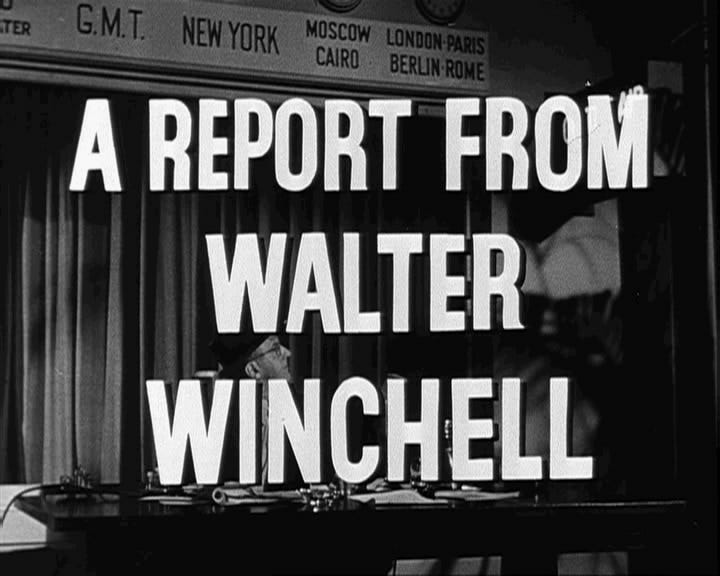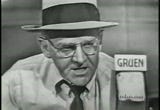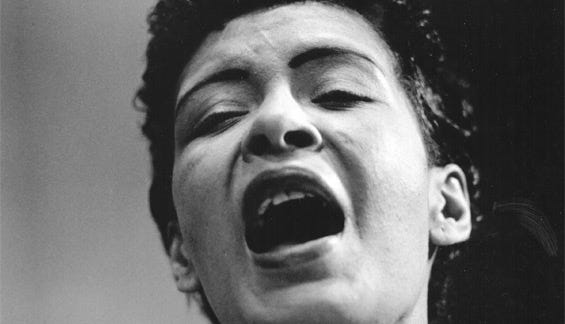Billie Holiday was such a presence in my family household that I suspect that she may be the first, at least in my memory, Black American face I have ever seen. My dad and mom had framed portraits of certain heroes on their living room wall in San Francisco. They were Jean Cocteau, Anton Artaud, and Billie Holiday. The very first recording that I think I heard was Lotte Lenya singing from “The Three Penny Opera. ” But indeed, the second most played recordings were by Billie, and to this day, I can’t remember what songs they were or from what album. My first impression of her is her voice, which as a kid, I found very foreign and strange sounding. Now come to think of it, my parents had weird sounding recordings at home. I was raised on the music of Edgar Varese, Paul Bowles's recordings of various Moroccan tribes, and the music of Moondog. All three, to this day, are still perfectly weird to me. My parents' only mainstream albums were classical albums, mostly the recordings of the eccentric (another weirdo) Glenn Gould and the most conservative of all, Vivaldi’s “The Four Seasons. ”
My father had a direct connection to Billie Holiday because he visited her at Jazz clubs on Central Avenue when he was a zoot-suit-wearing teenager. He told me that he once purchased a glass of coke cola for her during one of her appearances in Los Angeles. I can’t imagine the effect on a white Jewish teenager when meeting the titan of jazz singing Billie or better known to her fans as Lady Day. I have heard many jazz singers in my life, but there was something about Billie that made her stand out. Now, I can appreciate her genius and her ability to express herself through song, but as a child, it alienated me in a sense. Her misery, expressed through her music, was entirely foreign to me. On the other hand, I had an intuitive total understanding of music from the Walt Disney films, which I had never seen. Only from the Mickey Mouse Fan Club TV show or the Disney hour every Sunday night. I was not too fond of the show, but culturally I connected to it, maybe because every kid in my world was in tune with that world. The Sherman brothers wrote the most famous Disney songs, which stuck in my mind like glue. By instinct, and seeing how my parents were affected by Billie, I knew she was the better artist - or as they say on the street - “the real deal. ”
The way she pronounced her words while singing is one thing that took me a while to grow into. I realized later that the best art is where you have to struggle at first, and then somewhere down the line, you accept it. I’m that way with Van Dyke Parks’ first album, “Song Cycle. ” But that’s another story! As a writer, I’m intrigued by accents and how words are incorporated into popular songs. Lately, I have been giving thought to Lord Buckley and his use of wording when he did his stand-up act if it is even an act! I have a hard time telling what’s real or not real concerning someone on a stage (or, for me, on a TV show) that the border becomes hazy as I watch a performance.
I recently watched an old videotape of the journalist Walter Winchell, a terror and a man who many feared to cross. Also, it has been reported that the J.J. Hunsecker character in the classic film “Sweet Smell of Success” was based on Winchell. Nevertheless, what impresses me is not his politics but his manner of presenting the news, either by the page and, even more impressive, his vocal style while ‘reading’ the news. He was known to come up with a language of sorts called “Winchellese.” He used a lot of sexual terminology within his ‘talks.' My favorite is “trouser-crease-eraser, ” which I gather is a man with an erection. He also has some great sayings for the act of marriage: “Lohengrin it, “handcuffed, ” and of course, “Mendelssohn March. ”
As of now, and of course, these two individuals: Holiday and Winchell, are so far apart on so many levels, but I now have a craving to hear the phrasing of a song inspired by instruments as well Winchell’s playful use of language. Perhaps both are the children of Hugo Ball?






